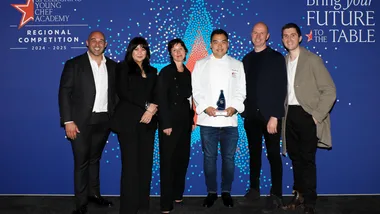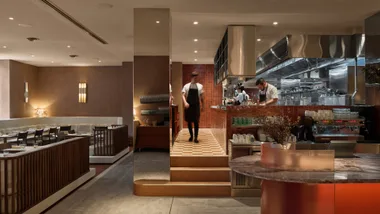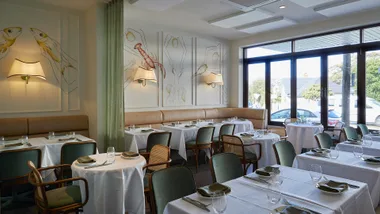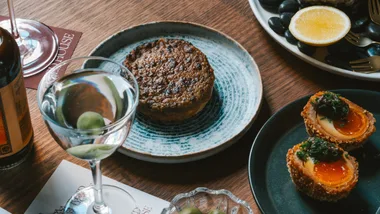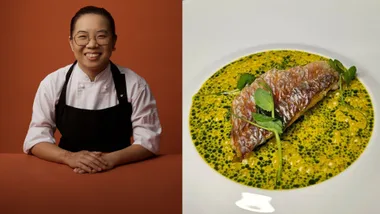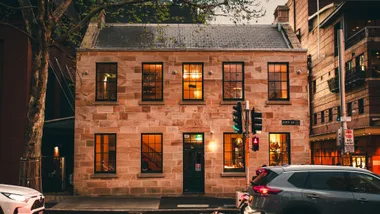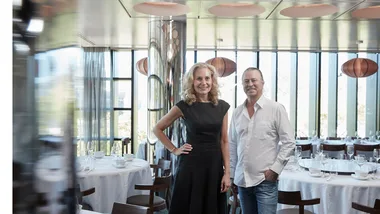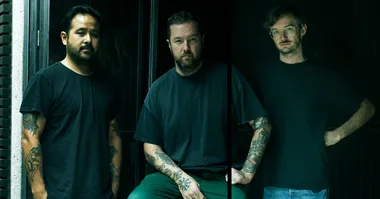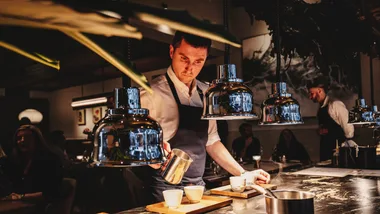Upon arriving at Anthony Bourdain’s summertime compound – a rented mansion in one of the Hamptons, east of New York City, with a big yard and a pool and hedgerows tall enough to keep neighbours and society in general at bay – I find him in the kitchen. Shirtless, tanned, lithe, and surprisingly tall and fast on his feet no matter how many times you meet him, he’s dishing out chicken-salad sandwiches. Anybody in earshot – a wild constellation of family, friends, employees, television producers, plus a coterie of his wife’s jiujitsu sparring partners – accepts. He takes slices of soft supermarket wheat bread, piles on the mayonnaisey salad, slices the sandwiches in half, corner-to-corner, and passes them out on paper plates with an encouragement to grab a beer from the fridge. It is 11am.
Later, on the back porch, over bottles of Modelo Especial, we talk about Appetites, his second cookbook. It’s simple, practical, useful. It’s not something to establish bona fides he doesn’t need; it’s an account of how he actually cooks at home for his family. (The chicken salad is in the book.)
Bourdain is, for the few who may be uninitiated, the godfather of everything good happening in writing about food today. His memoir, Kitchen Confidential, which has the pace of a crime novel and the social conscience of Orwell’s non-fiction, reframed the conversation about cooks, chefs, and restaurant life. His food-and-travel shows – Parts Unknown now, No Reservations, and A Cook’s Tour before it – are a gauntlet thrown in the face of the Vaseline-lensed, waterboard-you-with-rosé lifestyle shows that dominated the airwaves before he showed up.
His truth-telling, swashbuckling, world-travelling aside, I know that we are both parents, but I’m worried that the impression the book has made on me will offend him. He agrees off the bat, however. “More than anything else,” he admits, “it’s a dad book.” Writing it, he says, “is a function of age, it’s a function of all of the places I’ve been, it’s a function of the distance between where I am now and the sort of point of view and life experience I had when I wrote Kitchen Confidential. And, most importantly, it’s a function of fatherhood”.
I’m interested in the distance between the old Bourdain and the new – but also in Anthony Bourdain’s late-in-life choice to become a dad. “For the first time in my life, I felt that I was up to the job. I mean, I’d wanted a child, of course, in the way that most people think they want a child. But I think I always, to my credit, recognised that either my situation or my character was not adequate to the really enormous responsibility of being a good parent. A child is an impressionable, growing, needy creature. At 50 it was an epiphany – not only do I want a child, but I felt that I could give love to a child and receive love from a child responsibly.
“I’d always had this nose-pressed-against-the-glass sort of curiosity, and even a yearning for a ‘normal’ life. I didn’t really know what that entailed, whether I was capable of it, whether it existed. I suspect, like in everything, my expectations weren’t reasonable. I still don’t really know what that is. But about the parenting, I have no regrets. I have a healthy, happy, funny, bright kid with good self-esteem. My father would’ve loved her. She has a good bullshit detector, a good hypocrisy detector – those are qualities that I’m happy to see in my child.”
Okay, so why a cookbook?
“As with everything I do I’m probably working through some personal issues, or trying to. Maybe because I noticed that I was bringing to bear, in an occasionally smothering way, the skills I learnt as a professional. I would have a prep list on the refrigerator and a menu plan for the week, and I was only cooking for my daughter, occasionally my wife, the nanny, her son, and occasional visitors. But I had a highly organised menu that would feed into itself: lobster today, lobster salad tomorrow – it all worked the way a restaurant did. And it was my clumsy way of expressing love and normalcy. I’m not cooking larks’ tongues in aspic here for my family – I’m making meatloaf. We’re all susceptible to a simple good bowl of spaghetti with Sunday gravy and organising yourself in a way that you could accomplish, that is useful, and technically satisfying to me.
“Plus, as a publisher” – Bourdain has a cookbook imprint at Ecco, an American publishing company – “I wanted to prove that I was capable of creating a beautiful object as well. The idea that I could do a cookbook with a Ralph Steadman cover” – let us pause and note that the cover of Appetites is by Ralph Steadman, the artist responsible for the covers of every classic Hunter S Thompson book – “that takes the food photography farther than what’s already a pretty high benchmark, like that set by Fergus Henderson or Martin Picard or Fred and Dave at Joe Beef. So I just thought, let me get a really great photographer and give him absolute licence to kill, just go f–king berserk.”
For all the dad talk and the unusual but not undomestic scene, there’s a crackle of energy to everything Bourdain says. He hasn’t gone slack, doesn’t seem any less curious than he did when he first chronicled the travails of Ecuadorian line cooks in New York in the ’90s. I overhear him planning a Los Angeles episode of Parts Unknown that’s exclusively Latino; he threatens one of his producers that the Rome episode they’re working on needs to be the best thing they’ve ever made. “If I slip and die in the shower the night it goes on the air, I want to die happy.”
I prod him for self-analysis. What keeps him going? What’s the difference between the idea of Anthony Bourdain and the real one? “I was always careful of the cautionary tale of my hero Hunter S Thompson. He was somebody who was trapped in a persona. I was so affected by Fear and Loathing in Las Vegas and Fear and Loathing on the Campaign Trail, and very aware of the fact that he basically wrote nothing after that other than scraps that they’d have to scrounge – little bits.
“I never felt like I needed to go out of my way to prove that I’m something other than who I am – that I will try really hard to not f–k up, to not be an asshole, to not do business with people who make me angry or make me angry with myself. It’s always a quality of life issue for me.
“Previous work experience taught me the virtue of showing up to work on time – if I say I’m going to do something, I’m going to work really hard to not disappoint you; I’ve had a lot of experience earlier in life disappointing people. I’ve been lucky, and if that luck goes away, it’s not for lack of trying, it’s not going to be because I f–ked up – I hope. Or did something stupid or selfish or impulsive or greedy.
“Since Kitchen Confidential I’ve been in the really odd position where I get paid to be myself. That’s me. I don’t hide that from my daughter; I try to live my life so I won’t have to feel ashamed of it later. But,” and here he pauses to survey the scene in front of him, the month-long summer pause where his kid and her grandparents are out in the yard and the television folks are packing up to go back to the city and the jiu jitsu contingent is atwitter about an Olympic fight they’ll watch that afternoon, “I’m still figuring shit out.”

